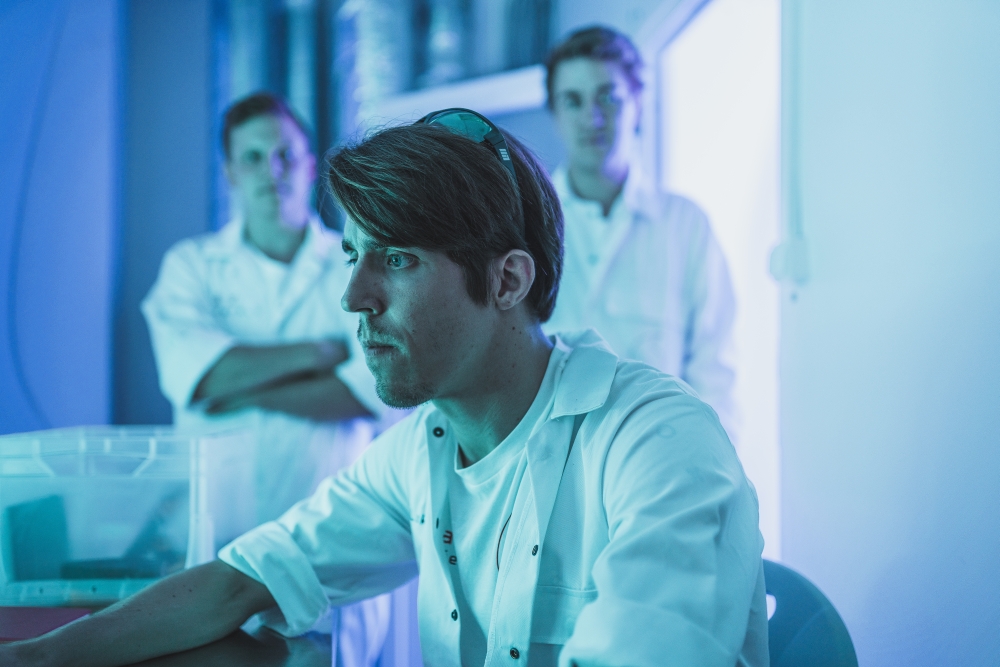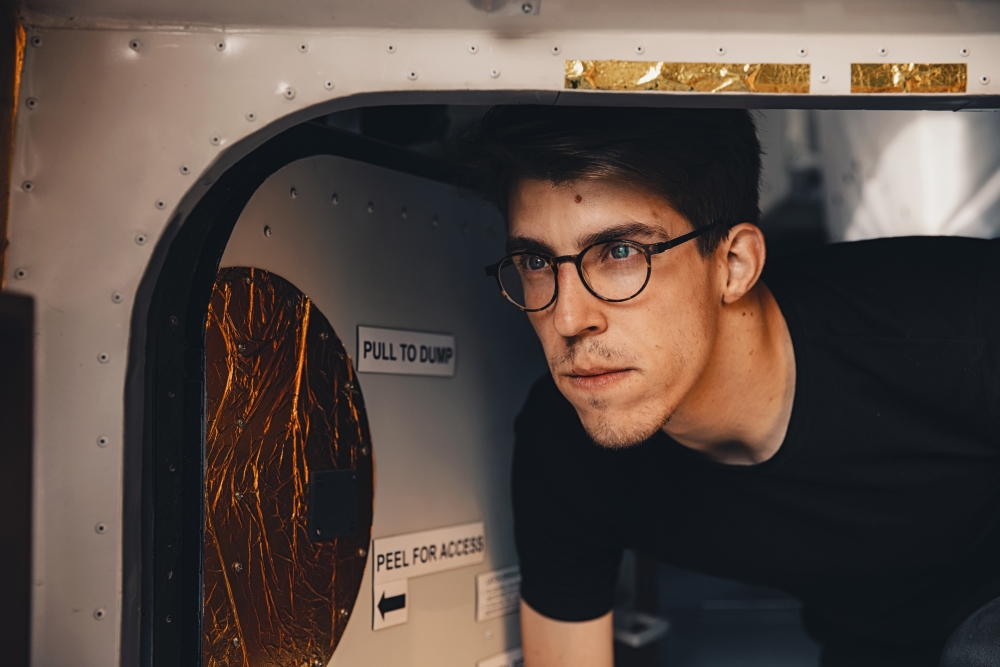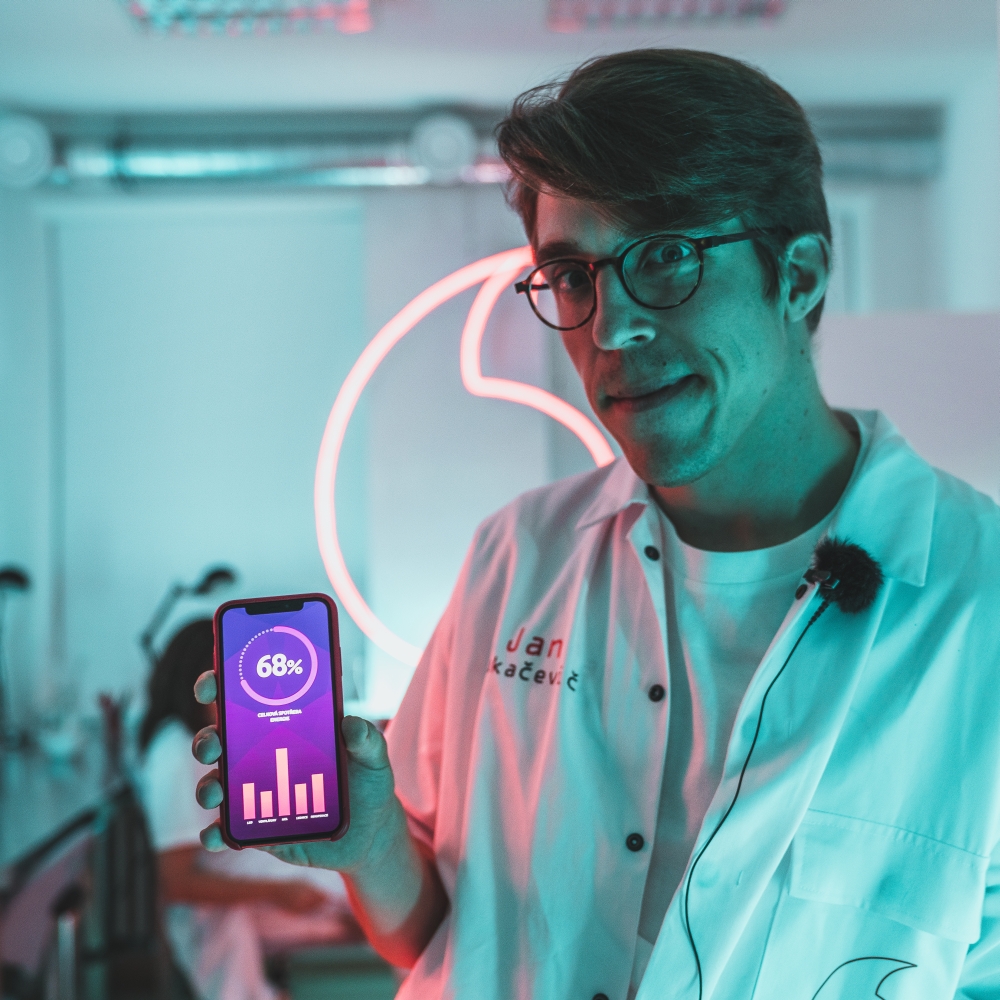Jan Lukačevič: Science always delivers the best it can do
How does an intelligent young man go from finishing his studies and starting his career more or less similarly to lots of other people to being asked by the media to discuss the meaning of life and the unused potential of our country?
Well, it’s pretty much natural, you know. At a certain point, questions like “How did you get to do this?”, “What do you enjoy about it?”, and “What are you working on?” all get answered and someone realizes it might be a good time to ask something else. What’s surprising for me is this snowball effect, because I don’t try to be seen or offer to give interviews. Not at all. In fact, I usually try to limit these activities to make more time for my own work, especially since the work I do adds credibility to what I talk about in interviews. Without it, my interviews would all just be empty statements devoid of experiences and actual content. Science is my priority. I don’t know if all this took a turn in one specific moment; the general, society-wide topics gradually and discreetly started to overlap with my outputs as I was being approached more and more often.
What does a typical workday look like for you then? You get up, put on a white coat, and go to the lab?
That would be just great, because I’d have a lot of attractive photos then! It doesn’t work like that at all, though. I only wear the white coat and clothes in our Marsonaut lab, and I don’t go there often enough to make it a routine. Most of the time I either work on my postgraduate studies or work at the Academy of Sciences. Specifically, I research data gathered by various satellites based on whichever phenomenon I’m exploring. At the moment, I’m looking into relatively unique waves close to the Earth, and I am working on a code to render the rough data so we can read it. I also study the data in colourful graphs called spectrograms, where you can find specific structures, if you know how. And I create various statistics or write about my observations.
Is this about exploring the universe itself to find out if specific events are taking place in certain parts of it, or will this data have a more profound use later on?
Well, let’s say it’s rather hard to defend, as it’s basic research which doesn’t have to necessarily provide any major results. Simply put, this is how we add new pieces to the encyclopaedia of human knowledge that future research may rely on. Everything is related! I know this sounds rather superficial, but it’s true in this particular case, and although this research isn’t super-practical, it’s not going to end up collecting dust on some shelf somewhere, either.
In addition to these truly practical activities, do you spend any time working on theoretical, even philosophical physics, such as parallel universes and other hot scientific topics?
Not at all. It seems to me so esoteric and “superfluous” when compared with what I do, so I don’t let it occupy my mind or capacity. I don’t see any sense in dealing with things I don’t understand at all, especially when they aren’t based on anything and are more like assumptions and speculations.
 Photo: Marsonaut
Photo: Marsonaut
Some prominent scientists, such as Kurt Gödel, have dealt with things like these, right?
Yes, they have. However, Gödel specifically dealt with very abstract concepts in general. I don’t look down on this at all, but for him it was a fundamental part of his work, while for me it’s very distant. And it would take me years and years to get familiar with the mysteries of particle and quantum physics to be able to work with these concepts as building blocks of something more complex. Besides, the physics I deal with, the real world, seems fascinating enough to me without the need to be embellished and enriched by things like that. This world we live in is absolutely beautiful the way it is, and I don’t feel any need to make it even more complicated or look for connections where there may not be any.
Not long ago, we published an article on the Šponers, who, as part of their research at CEITEC in Brno, are trying to uncover the origins of life on Earth. They deal with RNA and DNA and quite regularly say things like “This is how this place looked four billion years ago…”. I’m no expert at all, so when I hear something like that I always think, “How do they know? People aren’t even able to agree on events that took place much later than that! How could they know what happened four billion years ago?” Let me ask you then: How much of what you say as a scientist are only your assumptions?
Science, in general, isn’t dogmatic, so only rarely can we be 100% sure to claim something and there are always other interpretations at hand. However, let’s not forget that scientific statements are often based on a huge amount of proof, so we simply accept that things are the way they are claimed to be. Sure, it’s always good to remain sceptical, but it shouldn’t keep us from moving on – if that happened, we’d just keep discovering absolutely basic things over and over again. It’s common for me to draw on research presented by other scientists, and when there’s a transparent path leading to a piece of information in my research that I can trace back, I accept it as a standard solution and work with it accordingly. This is how science works with information.
And what about people to whom information, no matter how provable, means nothing? “The Earth is flat, there was no Holocaust, and everything actually happened differently.” What’s your opinion here?
I don’t think this has anything to do with science’s inability to be certain. I recently saw a documentary about a movement of people who believe the Earth is flat and concluded that most of them suffer from some kind of deep inner insecurity in confrontation with the regularly accepted fact that the Earth is round, which makes us just one of billions of planets. The information that our existence is only fleeting, that we are here now and one day we no longer will be, and that in this universe we mean nothing – all this is impossible to process for them. However, if the Earth actually were the only flat planet, it would have made their existence meaningful and somehow special. For some reason, this is incredibly important for them. This may all be caused by a simple human need to belong somewhere and to be significant and “immortal”.
Do you think those who deny climate change fit this description, too?
This problem’s a bit different, I think. The idea of flat Earth is a classic conspiracy theory and, just like many others, tends to make people important and significant because they “know more than them”. This makes them believe that they aren’t just regular sheep in a herd and has a healing effect on them, as they think, “We have something others don’t.” With climate change denial, however, it’s much more complex and may be related to a fear of change. If these people admitted that there actually have been some changes and that they’ve even contributed to them, the guilt they would start to feel would generate pressure within them to change and do something about it. However, people find it difficult to do anything, especially if it means lowering their standard of living, which is often mentioned as one of the solutions. To say nothing of the fact that a lot of people don’t live exactly the most comfortable lives and cannot imagine living letting that get any worse.
 Photo: Marsonaut
Photo: Marsonaut
Why should people believe something serious is happening now? They’ve been hearing news like that all their lives, like how we’ll soon run out of oil or other resources. However, it’s turned out that lots of those prognoses were just wrong and that science came up with new and better ways to extract oil from the ground. Why should we believe that something serious is really happening right now?
Why now? Sure, it only makes sense to be a bit sceptical, but it doesn’t make sense to deny everything science comes up with. Science always delivers the best it can do. That’s how it works – revising repeatedly and pushing the limits. And why believe? Nobody has to believe; this is more about working with it in some way. At least to me it sounds more reasonable to be organized and careful than to suddenly find out, in the middle of a fire, that things are actually burning and oops, we should have believed it back then.
Does science make you optimistic or does knowing more make your life complicated?
Well, I am optimistic, but it’s not thanks to my knowledge – it’s because I don’t read newspapers too much. I study data, I mean valid data, not the fuzzy interpretations that the media offers. If I had to rely on the information from the newspapers, I’d most likely be pessimistic and probably even scared, because that’s exactly what even relatively normal and established media have been contributing to lately. Unfortunately.
In addition to what you do, is there any other branch of science you find exciting and would like to deal with?
Biology. Very much. I’d also enjoy some material sciences as well sciences related to mechanics and fluid dynamics, which overlap with our research a bit, as the cosmic plasma flows and there are some turbulences in the flow as well… However, pure hydrodynamics is attractive enough, even when it doesn’t have anything to do with these cosmic things.
Do you like science fiction?
Some of it. I like hard sci-fi which is based on scientific knowledge and works with it without trying to get too creative about what the future has in store for us, such as The Martian, which is a great movie because it’s based on real-life physics. Or The Three-Body Problem, which is a book I’ve been looking forward to for a long time now. I’ve heard a lot of great reviews about it, but it’s very long so I haven’t had a chance to start yet.
 Photo: Marsonaut
Photo: Marsonaut
And what about films and series on scientific topics? Do you suffer when watching them?
I’m fortunate that there aren’t too many of them, unlike the ones about doctors. But yes, I do suffer, mainly because it’s almost always a mixture of various stereotypes, untruths, and artistic depictions of ideas of what science is like. And only rarely are they based on truth. It’s more about the authors letting their imagination run wild, and I have a low tolerance for that.
So I shouldn’t ask if you’ve ever been compared to Sheldon Cooper, I guess…
I have, unfortunately. And to Howard Wolowitz, the cosmic engineer. This particular series is just a huge example of untrue stereotypes. Its authors turn the main characters into total freaks, kind of autists, totally worthless when it comes to social contact, and too intelligent for their own good. Debunking these stereotypes is my own personal mission, as stereotypes create false ideas of how things really work, and this isn’t very helpful for our society in general.
Wouldn’t it be terribly boring to shoot a series showing scientists how they really are?
Quite the contrary! It would be amazing. There’s a great, absolutely normal team in our department, no matter how weird that may sound.
That seems to be the very problem, though. People are rarely interested in a series about regular people.
One of my colleagues bakes his own bread and shares it with the office. From time to time, we all have sushi because almost everybody can prepare it – a side effect of our long-term cooperation with Japanese sites… And sure, sometimes at lunch, we discuss satellite data calibration or checking the defence mechanism that helps read the data from a probe on Mars. Usually, though, we talk about normal stuff, like football. At the same time, my colleagues are fun, they don’t take science too seriously, and they’re pretty cool to spend time with.
If you could forget all about money, what would you like to achieve in your career? I assume it’s not the Nobel Prize.
No, you’re right – that’s just the flashy side of science, nothing more… In general, though, I don’t like setting any long-term goals because I know how making plans works. There’s this pedantic comment, saying that a plan ceases to work once its proposal has been finished. Once you’ve planned a thing, it goes some other way. And it makes no sense to rely on this, so I don’t like doing it. To say nothing of the fact that people tend to idealize their long-term plans, so even if they do manage to achieve them, they usually find out it wasn’t really worth it.
 Photo: Jan Zátorský
Photo: Jan Zátorský
As a scientist and when working on your projects, you must do some planning, though.
Yeah, but these are practical plans. Not about achieving some fantastic things or about jumping off a bridge if we fail. The way I see it, this is more about having an inner compass based on some values and things that are important for us in life, and to maintain direction accordingly. And it’s not a problem if you leave this path from time to time because if you can still look at this compass and say “Yeah, well, I’ve been going some other direction for three months now, but I can still get back to the original path”, then everything’s alright. If I stay within the guide rails along this path, then it’s not a problem if I stop from time to time, take a look around, even go back or zigzag a bit. And my path, the path of Jan Lukačevič, is to devote my knowledge and experience to science and progress in order to help people. I believe that science is mainly and primarily a way to help people.
Would you agree that based on the numbers and results, Czech science doesn’t compare very well with science elsewhere in the world?
As a whole it doesn’t, that’s a fact. And it’s because we simply don’t have the human potential to develop top scientists for any area. Our country isn’t big enough for it and some branches have no tradition here, so the fact is that we are average, even less than average in lots of them. I’d like to add something important, though; there are areas in which we absolutely excel on a global level. Take for example the incredible know-how of electron microscopy here in Brno. Or cosmic physics, cosmic research – the high level we’ve reached is even suspicious, when you look at which countries also excel in this and how much it costs – and yet we keep or even set the pace! This applies to nanomaterials and biochemistry as well. There are several areas like this, and they’ve given us a good reputation all over the world.
You like to popularize science, which is not a simple discipline. Have you gathered any know-how you could share?
I did a lot of thinking about this when we were working on our Marsonaut – what exactly made it so popular? The numbers were just incredible, it spread all over the world, and tens of millions of people saw it. I think the key to success lied in making use of the contrast between existing stereotypes and the real situation. On one hand, we offered exactly what people wanted: yes, this is what scientific research looks like, and yes, they are the people wearing white coats in a shiny sci-fi lab. On the other hand, we destroyed the established ideas by putting a team of very young people into the shiny lab; these people were modest and behaved just like any regular person would, and it was all very easy to imagine for anyone watching. Luck played a part, too; growing vegetables is easy to grasp, as everybody knows what a salad is and that it’s important for someone on a voyage through the universe who has nothing to eat.
#jetovtobe is a platform by Vodafone which enables young people to try out potential dreamjobs. One of its projects is Marsonaut, where a team of young scientists led by Jan Lukačevič explores the ways to grow vegetables outside planet Earth in an environment that simulates the conditions on Mars.
Could you tell us more about the project?
In the very beginning, there was Vodafone as a private subject and sponsor of the project aiming at young people and discussing the jobs of the future that don’t exist yet. In this phase, I was contacted by the agency Vodafone had hired for this project because they knew I was doing something with Mars and one of the future jobs could be a scientist – different to and more modern than today’s scientists. Together with the agency, we formulated what my future job could look like. People from the agency had obviously seen The Martian movie starring Matt Damon and wanted to grow something; I was opposed to it, saying it wouldn’t be so simple and we’d need more money from Vodafone if we were to do something really big. And we came up with an idea to base the project on real scientific facts and push them further towards the vision of a colonized Mars. One thing led to another and I kept providing the scientific facts and took the helm while they kept rowing. And that’s exactly how it happened.
 Photo: Marsonaut
Photo: Marsonaut
The project being sponsored by a private company – was it an advantage or a complication?
It limited us a bit, as Vodafone naturally wanted to be seen all over it. Not everything always went according to our plans, either; we would invite journalists to take photos so we could “get it off the table”, but on that very day all the plants in the lab died. And that was another reason why running the lab required a brutal amount of work. On the other hand, the private money enabled us to do things we couldn’t have done otherwise, as we’d have been trapped in the classic financial scheme of various grant applications and would have to keep reporting all the time. This gave us huge flexibility, so we could buy almost anything, do relatively quick changes whenever we needed, and so on.
We’ve already talked a little about the stereotypes regular people have regarding scientists. As part of your popularizing efforts, how can we show scientists at work when most scientific work today consists of sitting at a computer, which isn’t too photogenic? How to tell the people outside this environment that a lot of excellent things are happening in science? And how to do this in an attractive, authentic way without offending the scientists themselves?
That’s the fundamental question. And no, white coats aren’t a universally applicable answer. On the other hand, I’ve noticed that when some people spend long years in research, they no longer have any idea what the people from outside may find attractive. The experience with Marsonaut and the media agency has pushed me much further. I kept explaining to them how it all could work out and they said: “Jeez, that’s absolutely fantastic!” And I was wondering what was so fantastic about it. And this is precisely the role of the middlemen who have to find the exceptional moments amid the scientific routine which the scientists no longer see but which, for the general public, are the “wow” moments we are after.
I assume that, being a scientist, you don’t like to guess, but let me ask you anyway: What will we see first – people on Mars or high-speed trains in the Czech Republic?
People on Mars, 100% sure. I’ve been following this and daresay that global efforts depending on factors outside of the country are likely to be more successful than this local thing that has been put aside so many times. And even if people who’d like to implement it get a chance, they aren’t competent enough to do a quality job. No matter how critical and perhaps pessimistic this may sound, seeing people on Mars seems more realistic than taking a ride on a high-speed train in our country or the D-line subway in Prague together with a number of other things that have been in the planning stages for a long time now.
Read more about the topic
As Europe’s deep-tech landscape accelerates, Brno stands out as a city where science turns into startups. At this year’s Velvet Innovation Conference, which explores courage and resilience in innovation, emerging projects took the stage at the Startup Showcase. ACTOSens, Citymind, Lightly, EpiQ and Veriteus are those to watch. Curated by the innovation agency JIC, these startups combine academic excellence with global ambition, addressing challenges from healthcare and AI to cybersecurity and industrial automation.
Once known for its precision engineering and microelectronics, the Brno region has transformed into one of Europe’s most dynamic space hubs. More than 30 companies in the region are now active in satellite and space technologies, employing over 400 highly qualified specialists — a workforce that has grown by a quarter in just three years. Supported by the innovation agency JIC, which operates business incubator ESA BIC in the region and connects startups with funding opportunities, the Brno Space Cluster unites leading players across the local space ecosystem. This collaborative platform is now taking Czech space excellence to the international stage at Space Tech Expo Europe in Bremen.
